
Newsletter of the
INTERNATIONAL ENVIRONMENT FORUM
Volume 18, Number 8 --- 15 August 2016
Website: iefworld.org
Article submission: newsletter@iefworld.org
Deadline next issue 13 September 2016
Secretariat Email: ief@iefworld.org General Secretary Emily Firth
Postal address: 12B Chemin de Maisonneuve, CH-1219 Chatelaine, Geneva, Switzerland
Download the pdf version
From the Editor, Request for information for upcoming newsletters
This newsletter is an opportunity for IEF members to share their experiences, activities, and initiatives that are taking place at the community level on environment, climate change and sustainability. All members are welcome to contribute information about related activities, upcoming conferences, news from like-minded organizations, recommended websites, book reviews, etc. Please send information to newsletter@iefworld.org.
Please share the Leaves newsletter and IEF membership information with family, friends and associates, and encourage interested persons to consider becoming a member of the IEF.
INTERNATIONAL ENVIRONMENT FORUM
20TH ANNUAL CONFERENCE
Nur University, Santa Cruz, Bolivia, 7-9 October 2016
on the theme
Implementing the Sustainable Development Goals as communities and individuals
With the launching of the United Nations 2030 Agenda and its Sustainable Development Goals approved at the UN General Assembly Summit last September, governments and the international community are heavily involved in implementation at the national level and in creating the relevant indicators and supporting measures. However, governments will not be able to reach these ambitious goals without widespread public support and involvement, and little has been done to make the SDGs accessible and relevant to the public. What has largely been a top-down process needs to be accompanied by a bottom-up process of public buy-in and participation. This conference will explore implementing the SDGs as communities and individuals. The deadline for abstract submissions is now 1 September (see below).
The conference will focus on three issues that concern everyone, and are of particular interest to Latin America:
• Responsible and sustainable lifestyles (SDG12)
• Values and education (SDG4)
• Sustainable urban communities (SDG11)
Lifestyles are an obvious starting point, since they are individual as much as collective. A lot of work has gone into preparing the 10-year Framework of Programmes on Sustainable Consumption and Production, including its educational component, and a global network on Education for Sustainable Living has been set up. The challenge now is adaptation to local situations and implementation. Under this issue we shall discuss the use of the SDG framework to encourage responsible and sustainable lifestyles in individuals, families and neighbourhoods.
Education is a cornerstone of the SDGs, both with its own goal and cutting across all the other goals. The fundamental transformation at all levels required by the SDGs will depend on strong motivation and changes in behaviour, and for this ethics and values are as important as information. Values-based education is an emerging area of practice with the potential to set youth on a path of responsibility and service. This issue provides an opportunity to share experience and to consider new directions.
With Habitat III, the United Nations Conference on Housing and Sustainable Urban Development (https://www.habitat3.org/), being held in Quito, Ecuador, the week after this conference on 17-20 October 2016, it is logical to consider the challenges of building sustainable urban communities. In many places, local governments have already taken the lead in transitioning towards sustainability. Beyond this, community-building depends on a number of neighbourhood processes including action, reflection, consultation and study that build trust and solidarity, and that empower a community to take charge of its own destiny. The SDGs can help to give communities a common vision and targets for a more just and sustainable future.
The IEF 20th Conference will provide an opportunity to dialogue and reflect about these elements of the SDG framework. What are the expectations, challenges and guidelines for achieving the progress needed? How to ensure social inclusion and participation? What are the implications for science, social action and policy?
The conference will be relevant to prominent personalities and opinion leaders, government officials, academics and students. It will include some keynotes and workshops, and also sessions for presented papers. The conference is co-sponsored by the Partnership for Education and Research about Responsible Living PERL/UNITWIN network.
Among the confirmed international speakers are Dr. Arthur Lyon Dahl (Switzerland), President of IEF and a retired senior official of UNEP, and Prof. Victoria Thoresen (Norway), Coordinator of the PERL/UNITWIN network and UNESCO Chair for Education about Sustainable Lifestyles.
Registration is now open on the PERL/UNITWIN web site at https://eng.hihm.no/project-sites/living-responsibly/upcoming-conferenc…. Deadline for abstract submission has been extended to 1 September. There is a registration fee of US$140 for international participants to cover meals, coffee breaks and other conference expenses on 8-9 October.
The Annual General Assembly of the International Environment Forum will be held on 9 October 2016 at Nur University in Santa Cruz, Bolivia, where the affairs of the forum will be discussed and the Governing Board elected. Members will receive the Annual Report and election instructions a few weeks before the Annual General Assembly, so that they can vote by email if they are unable to attend in person.
FORO INTERNACIONAL DE MEDIO AMBIENTE
20va CONFERENCIA ANUAL
Universidad Nur, Santa Cruz de la Sierra - Bolivia del 7 al 9 de octubre de 2016
Tema:
La implementación de los objetivos de desarrollo sostenible en individuos y comunidades
Con la adopción de la Agenda 2030 para el Desarrollo Sostenible y sus 17 Objetivos de Desarrollo Sostenible (ODS) aprobada en la Cumbre de la Asamblea General de la ONU en septiembre pasado, los gobiernos y la comunidad internacional están fuertemente comprometidos en su implementación a nivel nacional y en la creación de los indicadores adecuados y las medidas que los respalden. Sin embargo, los gobiernos requerirán de un fuerte apoyo de la sociedad y su activa participación para alcanzar estos objetivos ambiciosos. Hasta el momento poco se ha hecho para que los ODS sean ampliamente conocidos por el público en general. Normalmente este tipo de procesos se han dado con un enfoque de arriba hacia abajo, sin embargo consideramos que ahora debe ir acompañada de un proceso de abajo hacia arriba con la apropiación y participación del público. Esta conferencia explorará la aplicación de las ODS en los individuos y comunidades.
La conferencia se centrará en tres temas que son de interés general y de especial interés para América Latina:
• Estilos de vida responsables y sostenibles (ODS12)
• Los valores y la educación (ODS4)
• Las comunidades urbanas sostenibles (ODS11)
Los estilos de vida son un punto de partida más que interesante, ya que inicialmente son individuales pero a la vez colectivos. Un esfuerzo de 10 años se ha invertido en la preparación del marco para programas sobre consumo y producción sostenibles que ha incluido el componente educativo, y generado una red mundial de Educación para la Vida Sostenible. El desafío actual es la adaptación y la implementación a las realidades locales. Durante la conferencia discutiremos el uso del Marco de los Objetivos de Desarrollo Sostenible para fomentar los estilos de vida responsables y sostenibles en los individuos, las familias y vecindarios.
La educación es la piedra angular de los ODS y cada uno (educación y ODS) con sus propias metas pero, a la vez, transversales con todos los objetivos de desarrollo sostenible. La transformación fundamental en todos los niveles requeridos por los ODS dependerá de una fuerte motivación y cambios en el comportamiento individual, y para ello la ética y los valores son tan importantes como la información. La educación basada en valores es un área emergente de la práctica, con el potencial para establecer en los jóvenes un camino de responsabilidad y servicio. Este enfoque, brindará la oportunidad de compartir las experiencias y considerar nuevas direcciones que seguir.
Con la conferencia Hábitat III, sobre Vivienda y Desarrollo Urbano Sostenible (https://www.habitat3.org/), que se celebrará en Quito, Ecuador, del 17 al 20 de octubre de 2016, resulta lógico considerar los desafíos que implicará la construcción de comunidades urbanas sostenibles. En muchos lugares, los gobiernos locales ya han tomado la delantera en la transición hacia la sostenibilidad. Más allá de esto, la creación de comunidades sostenibles depende de una serie de procesos conexos, incluyendo la acción, reflexión, consulta y estudio que permita desarrollar confianza, solidaridad, y autonomía para que cada comunidad pueda hacerse cargo de su propio destino. Los ODS pueden ayudar a dar a las comunidades una visión y objetivos comunes para un futuro más justo y sostenible.
La 20va conferencia del IEF proporcionará una oportunidad para dialogar y reflexionar sobre estos elementos en el marco de los Objetivos de Desarrollo Sostenible. ¿Cuáles son las expectativas, desafíos y directrices para alcanzar el progreso necesario? ¿Cómo garantizar la inclusión social y la participación? ¿Cuáles son las implicaciones para la ciencia, la acción social y política?
La conferencia será relevante para personalidades y líderes de opinión, funcionarios públicos, académicos y estudiantes. En la 20va conferencia del IEF, se incluirán algunas ponencias y talleres, así como sesiones de trabajos presentados. La conferencia está co-patrocinada por la Red de Educación e Investigación para una Vida Responsable PERL/UNITWIN.
Entre los ponentes internacionales confirmados están: el Dr. Arthur Dahl Lyon (Suiza), Presidente del IEF y un alto funcionario retirado del PNUMA, y la Prof. Victoria Thoresen (Noruega), Coordinadora de la Red PERL / UNITWIN y Cátedra UNESCO para la Educación sobre estilos de vida sostenibles .
El registro está abierto en el sitio web de PERL/UNITWIN en https://eng.hihm.no/project-sites/living-responsibly/upcoming-conferenc….
La fecha límite para la presentación de resúmenes es el 1 de setiembre. Hay una cuota de inscripción de US $ 140 para participantes internacionales para cubrir alimentación, refrigerios y otros gastos de la conferencia los días 8-9 de octubre en la ciudad de Santa Cruz de la Sierra - Bolivia.
Second Workshop on Implementing the Sustainable Development Goals
More than 50 people attended the second high-level workshop in Geneva, Switzerland, on 7 July 2016, organized by IEF member Joachim Monkelbaan of SDGhub.org. The topic was "Connecting knowledge with action for the SDGs" looking particularly at opportunities for peace, business and policy coherence. The workshop was hosted by the Geneva Centre for Security Policy.
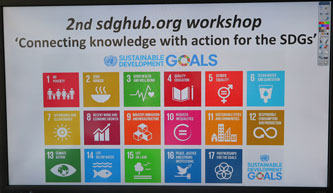 .
. 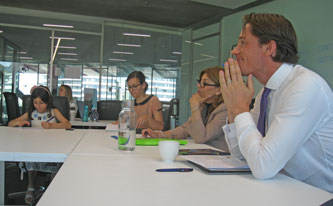
The workshop; Dr. Joachim Monkelbaan
The first panel on Governance: peace and security included Caty Clement and Joelle Tanguy of GCSP, Marika Palosaari of UNEP, and Eckhard Volkmann of the Inclusive Peace & Transition Initiative.
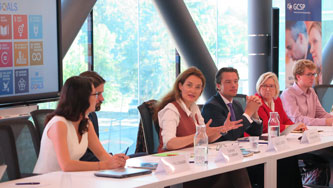 .
. 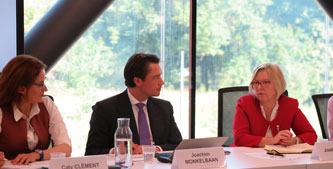
Caty Clement; Joelle Tanguy
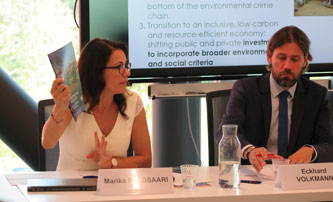 . .
. . 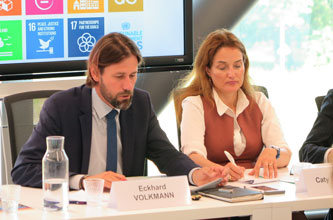
Marika Palosaari; Eckhard Volkmann
The second panel on Policy coherence as good governance featured Prof. Raymond Saner of the Centre for Socio-Economic Development, Moira Faul of Cambridge University and UNRISD, Joy Muller of International Federation of Red Cross, and Ruzanna Tarverdyan of Geneva Consensus Foundation.
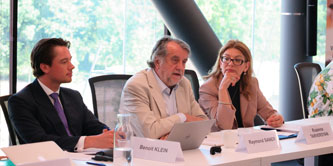 .
. 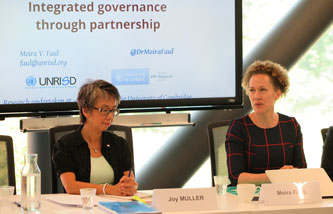
Raymond Saner; Moira Faul
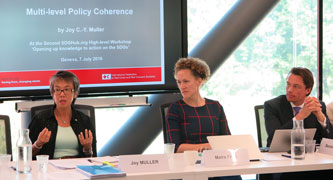 .
. 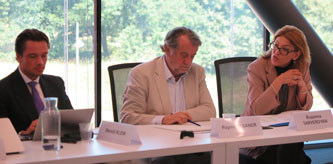
Joy Muller; Ruzanna Tarverdyan
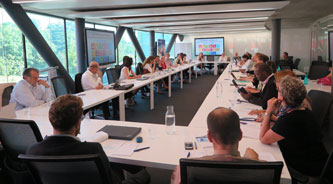 .
. 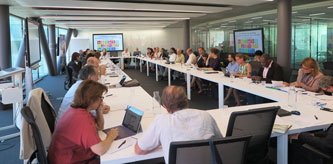
workshop in plenary
The last panel on the Private sector as an agent in SDG success was moderated by Antonio Hautle of Global Compact Switzerland, with talks by Arthur Dahl of ebbf - Ethical Business Building the Future and IEF, and Benoit Klein of Implenia, a big construction firm.
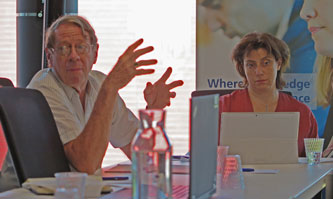 .
. 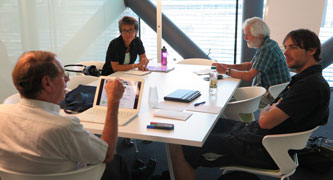
Arthur Dahl; Arthur Dahl's afternoon workshop
The afternoon included parallel brainstorming sessions on various topics. Arthur Dahl of the International Environment Forum led one on Engaging communities on the SDGs.
The workshop series will continue in the autumn.
See the report of the first workshop at https://iefworld.org/node/796.
The challenge of implementing a global plan at the national level
Baha'i International Community, New York, 15 July 2016
In a global society, there is only the illusion of unilateral action.
This was one of the themes that emerged from the discussion at an informal breakfast meeting held on Friday, 15 July 2016, at the offices of the Bahá’í International Community, the 35th in a series of gatherings on the post-2015 development agenda.
Taking the theme “Genuine stakeholder engagement for effective implementation and review: the national level lens,” the meeting focused on the challenges of implementing the Agenda 2030 at the national level.
But many of the participants agreed that none of the Agenda’s goals can be accomplished by any one nation, and the problems afflicting the world cannot be solved if each country implements these goals individually.
Roberto Bissio, Executive Director at Instituto del Tercer Mundo and Coordinator of Social Watch, began the discussion, saying that effective implementation means holding governments accountable. He highlighted Social Watch’s new 2016 “Spotlight on Sustainable Development (link is external)” report as a contrast to the shadow reports typically submitted by civil society organizations to the United Nations.
Mr. Bissio also discussed the “Goals for the Rich (link is external)” document assembled by a group of organizations including Social Watch. The document focuses on the responsibility that rich and powerful nations, corporations, and individuals have in addressing the issues that these development goals seek to resolve. Many of these issues, such as global climate change, are disproportionately caused by the rich and powerful, he said.
The next speaker, Arelys Bellorini, the United Nations Representative for World Vision International, talked about the need for citizens to participate in achieving the new development goals and for action to be taken not only at the international but also at the national and local level.
Ms. Bellorini presented the results of a survey taken of 22 countries that had volunteered their own national reports on their Agenda 2030 efforts. The survey’s aim was to judge how open, inclusive, and transparent the reporting process had been, and the results indicated that even in those countries where civil society organizations were well aware of the Agenda 2030, there was not necessarily a corresponding awareness of the national plans.
The last of the main speakers was Itai Madamombe, Special Adviser on the 2030 Agenda for Sustainable Development in the Executive Office of the Secretary General of the United Nations. She reaffirmed the idea that individual citizens should be aware of the 17 Sustainable Development Goals – which lie at the heart of the Agenda – and that they should strive to hold their governments accountable to the promises they have made in implementing them.
The universality of the agenda demands that every person and every institution play a role and take part in the learning process, said Ms. Madamombe. “It is not an agenda for north or south – every country is a developing country in this agenda,” she said.
Ms. Madamombe also emphasized the interconnectedness of development with peace and justice. She argued that the goals are indivisible and must all be accomplished together or not at all. This demands a new way of doing things, a horizontal pattern of action that grows from individuals and local communities rather than beginning with international organizations.
After the main presentations, participants shared their viewpoints, echoing similar sentiments, and indicating a strong consensus that the future of development lays in grassroots efforts that involve citizens in discourses with their local and national leaders.
One speaker noted the need for a real, formal, and systematic pattern of universal participation. Another speaker commented that such a pattern ought to have an overarching moral framework beyond the stated development goals, which are largely concerned with material improvements.
Sponsored by the BIC and International Movement ATD Fourth World, the series of breakfast meetings strive to bring together diplomats, UN officials, and civil society in an open dialogue.
See the BIC news item at https://www.bic.org/news/challenge-implementing-global-plan-national-le…. This relates closely to the theme of the next IEF conference mentioned above.
National launchings of Sustainable Development Goals
The global Sustainable Development Goals (SDGs) adopted at the UN summit last September now need to be translated into national commitments, and many countries are organizing or will organize national events or consultations to consider what goals and targets should be adopted at the national level. For example, the UK Parliament’s House of Commons Environmental Audit Committee has just called for written submissions from all stakeholders from all over the world to understand what can and should be done in the UK to achieve the SDGs domestically. This includes the identification of best practices from other countries and other policy areas (see http://www.parliament.uk/business/committees/committees-a-z/commons-sel…). The 2030 Agenda encourages governments to make these open participatory processes. This can be an opportunity for IEF members to become involved in this process in their own country, so you might investigate what your government is planning and if you can make a contribution. There may also be municipal governments that plan to launch an SDG process.
Some resources on the IEF web site may be useful in thinking about the contribution you could make, including a selection of texts from the Bahá'í International Community statements and Bahá'í writings relevant to each Sustainable Development Goal, and papers on "Europe and the 2030 Agenda: Regional Assessment", "Values-based education for environment and sustainable development" and "The 2030 Agenda and the Sustainable Development Goals: Challenges and Opportunities for Business".
Thought pieces
Many IEF members are active in some area of environment and sustainability, follow progress in their field, and try to develop innovative approaches inspired by spiritual principles and the Bahá'í writings. The Governing Board encourages you to consider preparing "thought pieces" on your latest reflections to stimulate discussion and eventually contribute to evolving discourses in specific areas. These could be submitted for possible publication in the IEF newsletter, and could also be a member's own blog post on the web site, or even a paper to be published on the web site. Some examples of thought pieces prepared in Canada can be read at http://ca.bahai.org/public-discourse/thought-pieces. Please send your contributions to newsletter@iefworld.org.
IEF seeks webmaster
As part of its strategy for wider member involvement in the work of IEF, the IEF Governing Board is looking for a devoted member who would like to become the new IEF webmaster and be responsible for the maintenance and improvement of the IEF web site (https://iefworld.org/). The site uses a Drupal content management system, and this now needs to migrate to a more recent version and to be adapted to be viewed more easily on smartphones. Sometimes items need to be formatted in html for posting on the site. There are opportunities to develop the blog and forum capacities of the site. There is also a regular need to sort out potential forum spammers from genuine applications for IEF membership on the user pages of the site. The web site is one of the main outreach activities of IEF and reaches thousands of people. If you are interested and can contribute a few hours per month to this important service to IEF, please write to newsletter@iefworld.org.
Routledge Handbook of Religion and Ecology
The Routledge Handbook of Religion and Ecology, edited by Willis Jenkins, Mary Evelyn Tucker, and John Grim, has just been published. It includes a chapter on Bahá'í by IEF board members Peter Adriance and Arthur Dahl. The book provides the most comprehensive and authoritative overview of the field. It encourages both appreciative and critical angles regarding religious traditions, communities, attitudes, and practices. It presents contrasting ways of thinking about "religion" and about "ecology" and about ways of connecting the two terms. The Handbook discusses dynamics of change within religious traditions as well as their roles in responding to global challenges such as climate change, water, conservation, food and population. It also explores the interpretations of indigenous traditions regarding modern environmental problems drawing on such concepts as lifeway and indigenous knowledge. More information about the book is available at https://www.routledge.com/Routledge-Handbook-of-Religion-and-Ecology/Je…. A kindle version is available on Amazon.
IEF joins Action for Sustainable Development
The International Environment Forum has joined the new initiative Action for Sustainable Development, a global civil society platform to engage with the sustainable development agenda, which was organized by Civicus and launched at the conference that Sylvia Karlsson-Vinkhuyzen attended in Bogota, Colombia, earlier this year. IEF is registered as an organizational member, but some interested IEF members may want to join as individual members as well. For more information, see their web site (http://action4sd.org).
War on Climate Terror (II): Fleeing Disasters, Escaping Drought, Migrating
By Baher Kamal http://www.ipsnews.net/2016/08/war-on-climate-terror-ii-fleeing-disaste…
ROME, Aug 11 2016 (IPS) - “No one can deny the terrible similarities between those running from the threat of guns and those fleeing creeping desertification, water shortages, floods and hurricanes.”
Hardly a short, simply-worded statement could so sharply describe the ignored human drama of millions of victims of man-made wars, violence, poverty and disasters like the one spelled out by the authoritative voice of Prof. Dr. Konrad Osterwalder, the former rector of United Nations University, a global think tank and postgraduate teaching organisation headquartered in Japan.
But while widespread violence and climate catastrophes are common to all continents and countries, there is an overwhelming consensus among experts, scientific community and international specialised organisations that Africa is the most impacted region by them.
Only second to Asia, both extension and population wise, Africa is on the one hand home to nearly half of some 40 on-going armed conflicts. On the other, this continent made of 54 states and 1,2 billion inhabitants, is the most hit region by all sorts of consequences of growing climate change—to which by the way it is the least originator.
Key Facts
The cause-effect relationship between climate and massive population movement is already an indisputable fact. See what world specialised organisations say:
1. – Droughts combined with population growth, a lack of sustainable land and water management, natural disasters, political conflicts and tensions and other factors have resulted in massive population movements across Africa, the United Nations Environment Programme (UNEP) reports.
Displacement in Africa is the result of a multitude of causes including struggles for political power, communal violence, disputes over land, floods, storms and other such natural hazards, it adds. More than half of the world’s fragile states are in sub-Saharan Africa, and some of these states have the largest numbers of internally displaced persons (IDPs).
“Africa has more countries affected by displacement than any other continent or region, and was home to more than 15 million internally displaced persons in 2015.”
In short, “the relationship between displacement and the environment is well established in Africa. People leave places with slow-onset environmental degradation, such as drought and desertification and continue to flee rapid on-set environmental emergencies such as tropical storms and flash floods,” says Saidou Hamani, Regional Coordinator for Disasters and Conflict sub-programme, UNEP Regional Office for Africa.
2. – According to the 2016 Global Report on Internal Displacement, there were 27.8 million new displacements in 127 countries during 2015, roughly the equivalent of the populations of New York City, London, Paris and Cairo combined; of the total, 8.6 million were associated with conflicts and violence in 28 countries, while 19.2 million were associated with disasters in 113 countries
The growing intensity of meteorological disasters due to climate change, coupled with the effects of environmental degradation is likely to continue being a factor behind human displacement.
— The International Organization of Migration (IOM) predicts there will be 200 million environmentally-displaced people by the year 2050 with major effects on countries of origin, transit countries, as well as receiving countries.
Individuals and communities displaced by disasters and climate change and those displaced by conflicts often experience similar trauma and deprivation. They may have protection needs and vulnerabilities comparable to those whose displacement is provoked by armed violence or human rights abuses. “Climate change is expected to further exacerbate the stress that fragile states are already facing.”
In Africa, environmental degradation and food insecurity are related to floods and other factors such as diminishing pasture for cattle as well as water, firewood and other natural resource scarcities, says IOM. Such factors contribute to displacement, resulting in increasing competition for scarce resources, which also contributes to armed conflict, particularly between pastoralists and sedentary communities.
This is especially pronounced in the Sahel (Lake Chad Basin), Sudan, South Sudan, Djibouti, Somalia, Ethiopia and Kenya, all of which have large pastoralist populations who migrate according to seasonal patterns and climatic variations.
Future forecasts vary from 25 million to 1 billion environmental migrants by 2050, moving either within their countries or across borders, on a permanent or temporary basis, with 200 million being the most widely cited estimate. This figure equals the current estimate of international migrants worldwide.
3. – “Changes in the regional climate are impacting issues linked to the availability of natural resources essential to livelihoods in the region, as well as food insecurity. Along with important social, economic and political factors, this can lead to migration, conflict or a combination of the two,” according to Livelihood Security Climate Change, Migration and Conflict in the Sahel.
4. – It is evident that gradual and sudden environmental changes are already resulting in substantial population movements, the UN Refugee agency (UNHCR) reports.
“The number of storms, droughts and floods has increased threefold over the last 30 years with devastating effects on vulnerable communities, particularly in the developing world.”
“Climate change and the environment have a big impact on the lives of millions of forcibly uprooted people around the world.”
Many of them rely on the environment for survival, particularly during emergencies – for food, shelter, energy, fire and warmth, medicine, agriculture, income-generation activities and more, adds UNHCR.
“Unsustainable use of natural resources can lead to environmental degradation, with lasting impacts on natural resources and on the well-being of the displaced and host communities. Additionally, competition over scarce natural resources, such as firewood, water and grazing land, can lead to friction.”
5. – Gradual changes in the environment tend to have an even greater impact on the movement of people than extreme events. For instance, over the last thirty years, twice as many people have been affected by droughts as by storms (1.6 billion compared with approx. 718m), according to the International Disaster Database.
In 2008, 20 million persons have been displaced by extreme weather events, compared to 4.6 million internally displaced by conflict and violence over the same period.
6. – Disasters and climate change are a growing concern. Since 2009, an estimated one person every second has been displaced by a disaster, with an average of 22.5 million people displaced by climate or weather-related events since 2008, according to the International Displacement Monitoring Centre report. (IDMC 2015).
7. – The Intergovernmental Panel on Climate Change, the UN’s science advisory board, projects an increase in the number of displaced over the course of this century. The majority of the people of concern to UNHCR are concentrated in the most vulnerable areas around the world.
Climate change will force people into increasing poverty and displacement, exacerbating the factors that lead to conflict, rendering both the humanitarian needs and responses in such situations even more complex.
Now two key related events are scheduled to take place in the coming days: Africa Drought Conference in Windhoek, Namibia, August 15-19, and the World Humanitarian Day, August 19.
Will this growing, unstoppable human drama deserve the attention of world politicians or at least of the mainstream?
It’s time to demolish the myth of trickle-down economics
Written by Max Lawson, Head of Advocacy and Public Policy, Oxfam Great Britain
Published Tuesday 19 July 2016
https://www.weforum.org/agenda/2016/07/it-s-time-to-demolish-the-myth-o…
The gap between rich and poor is reaching new extremes. Credit Suisse recently revealed that the richest 1% have now accumulated more wealth than the rest of the world put together.
This occurred a year earlier than Oxfam’s much publicized prediction ahead of last year’s World Economic Forum. Meanwhile, the wealth owned by the bottom half of humanity has fallen by a trillion dollars in the past five years. This is just the latest evidence that today we live in a world with levels of inequality we may not have seen for over a century.
Progress – but not nearly enough
Since the turn of the century, the poorest half of the world’s population has received just 1% of the total increase in global wealth, while half of that increase has gone to the top 1%.
Apologists for the status quo claim that concern about inequality is driven by “politics of envy”. They often cite the reduction in the number of people living in extreme poverty as proof that inequality is not a major problem and that globalization has delivered huge progress. But this is to miss the point. As an organization that exists to tackle poverty, Oxfam is unequivocal in welcoming the fantastic progress that has helped to halve the number of people living below the extreme poverty line between 1990 and 2010.
Yet had inequality within countries not grown during that period, an extra 200 million people would have escaped poverty. That could have risen to 700 million had poor people benefited more than the rich from economic growth. Central to this is the nature of globalization, and the type of economic forces that have driven it.
During the era of globalization, Oxfam’s research has shown that the average annual income of the poorest 10% of people in the world has risen by less than $3 each year in almost a quarter of a century. Their daily income has risen by less than a single cent every year.
There is no getting away from the fact that the big winners of globalization are those at the top. Our economic system is heavily skewed in their favour, and arguably increasingly so. Far from trickling down, income and wealth are instead being sucked upwards at an alarming rate. Once there, an ever more elaborate system of tax havens and an industry of wealth managers ensure that it stays there, far from the reach of ordinary citizens and their governments. One recent estimate is that $7.6 trillion of individual wealth – more than the combined gross domestic product of the UK and Germany – is currently held offshore.
Instead of an economy that works for the prosperity of all, for future generations and for the planet, we have instead created an economy for the 1%.
How it went wrong
So how has this happened, and why?
One of the key trends underlying this huge concentration of wealth and incomes is the increasing return to capital versus labour. In almost all rich countries and in most developing countries, the share of national income going to workers has been falling. This means workers are capturing less and less of the gains from growth.
In contrast, the owners of capital have seen their capital consistently grow (through interest payments, dividends, or retained profits) faster than the rate the economy has been growing. Tax avoidance by the owners of capital, and governments reducing taxes on capital gains, have further added to these returns.
As Warren Buffett famously said, he pays a lower rate of tax than anyone in his office, including his cleaner and his secretary.
Within the world of work, the gap between the average worker and those at the top has been rapidly widening. While many workers have seen their wages stagnate, there has been a huge increase in salaries for those at the top. Oxfam’s experience with women workers around the world, from Myanmar to Morocco, is that they are barely scraping by on poverty wages. Women make up the majority of the world’s low-paid workers and are concentrated in the most precarious jobs. Meanwhile, chief executive salaries have rocketed. CEOs at the top US firms have seen their salaries increase by more than half (by 54.3%) since 2009, while ordinary wages have barely moved. The CEO of India’s top information technology firm makes 416 times the salary of a typical employee there.
Across the global economy, in different sectors, firms and individuals often use their power and position to capture economic gain for themselves. Economic and policy changes over the past 30 years – including deregulation, privatization, financial secrecy and globalization, especially of finance – have supercharged the age-old ability of the rich and powerful to use their position to further concentrate their wealth.
This policy agenda has been driven essentially by what George Soros called “market fundamentalism”. It is this that lies at the heart of much of today’s inequality crisis, and has underpinned globalization. This word view is also known as neoliberalism, and has recently also been identified by the IMF as having been a significant driver of inequality.
A powerful example of an economic system that is rigged to work in the interests of the powerful is the global spider’s web of tax havens and the industry of tax avoidance, which has blossomed over recent decades, as a direct result of the globalization of finance. It has been given intellectual legitimacy by the dominant market fundamentalist/neoliberal world view that low taxes for rich individuals and companies are necessary to spur economic growth and are somehow good news for us all. The system is maintained by a highly paid, industrious bevy of professionals in the private banking, legal, accounting and investment industries.
It is the wealthiest individuals and companies – those who should be paying the most tax – who can afford to use these services and this global architecture to avoid paying what they owe. It also indirectly leads to governments outside tax havens lowering taxes on businesses and on the rich themselves in a relentless race to the bottom.
As taxes go unpaid due to widespread avoidance, government budgets feel the pinch, which in turn leads to cuts in vital public services. It also means governments increasingly rely on indirect taxation, like VAT, which falls disproportionately on the poorest people. Tax avoidance is a problem that is rapidly getting worse.
Dealing with the dark side of globalization
This is just one example of the dark side of globalization that has driven rapidly rising inequality in country after country, based on an economic system that has benefited the few at the expense of the many.
For Oxfam, there is no doubt that globalization has delivered tremendous progress in terms of reducing extreme poverty, but at a very high cost in terms of rapidly increasing inequality, and the neoliberal economic system that underpins it is deeply inefficient and ultimately unsustainable.
There is an urgent need to design a new economic system, a more human economy. A human economy which puts the needs of the majority first, to build a more equal and more sustainable world.
Top 10 messages of ‘Laudato Si’”
August 9, 2016 By Father James Martin, SJ, Catholic San Francisco
http://fore.yale.edu/news/item/top-10-messages-of-laudato-si/
http://www.catholic-sf.org/ns.php?newsid=22&id=64520
Jesuit Father James Martin, editor-at-large for America magazine, distilled the nearly 200 pages of “Laudato Si’” into 10 key messages in a four-minute video produced last summer, offering Catholics a visual digest of the document. View it at http://sfarch.org/green.
1. A spiritual perspective “The big contribution of ‘Laudato Si’” is its overview of the environmental crisis from a religious point of view. Until now, the dialogue was framed mainly with political, scientific and economic language.”
2. Effects on the poor “The disproportionate effect of environmental change on the poor is strongly highlighted on almost every page of the document. The pope provides many examples of the effects of climate change whose worse effects are felt by those in developing countries.”
3. Technocratic mindset critiqued “He critiques an unthinking reliance on market forces in which every technological advancement is embraced before thinking about how it will affect our world. Christian spirituality by contrast offers growth through moderation and the capacity to be happy with little.”
4. Authoritative teaching “Pope Francis explicitly states that ‘Laudato Si’” is now added to the body of the church’s social teaching, continuing a reflection on modern day problems that began with Pope Leo XIII’s encyclical ‘Rerum Novarum,’ on capital and labor in 1891.”
5. Christian/biblical roots “The pope takes readers through the call to care for creation that extends far back as the book of Genesis, when human kind is called to ‘till and keep the earth.’
6. Everything is connected “We are included in nature and thus in constant interaction with it. But our decisions have an inevitable effect on the environment. A blind pursuit of money that sets aside the interests of the marginalized and poor and the ruination of the planet are connected.”
7. Embrace of science “Pope Francis does not try to prove anything about climate change. ‘Laudato Si’” draws both on church teaching and contemporary modern day scientific findings to help modern day people find answers to contemporary questions.”
8. Selfishness and indifference critiqued “Frequently, decision makers are removed from the poor, with no real physical connection to their brothers and sisters. Selfishness also leads to the evaporation of the notion of the common good.”
9. Global dialogue and solidarity ”Perhaps more than any encyclical the pope draws from the experiences of people around the world. He calls into dialogue and debate all people about our common home.”
10. He addresses everyone on the planet “The document is hopeful, reminding us that because God is with us, all of us can strive to change course and work toward an ‘ecological conversion’ where we can hear the cry of the earth and the cry of the poor.”
Uniting against the illegal ivory trade
Global commitments to stop wildlife crime and help save elephants
August 11, 2016
https://www.worldwildlife.org/stories/uniting-against-the-illegal-ivory…
This World Elephant Day, it’s important to celebrate the positive momentum being taken to save this iconic species. Poaching trends in Africa are down from the peak of 2011, and governments, NGOs and individuals around the globe have made significant strides in 2016 to fight the ivory trade that fuels poaching.
• In May, African leaders gathered to witness the burning of over 100 tons of elephant tusks and rhino horns in Kenya. This symbolic event was meant to draw attention to elephant conservation efforts and the fight against illegal ivory trade.
• One of the most significant global actions taken to date for elephants is now being implemented: a joint commitment by the presidents of the US and China to enact “near complete bans” on the import and export of elephant ivory and domestic ivory trade. In July, new federal ivory regulations went into effect in the US. China, with the world’s largest legal ivory market, announced in June that it would publicly lay out its own timeline for a ban by the end of the year.
• WWF and TRAFFIC launched a major public awareness campaign in early July to persuade Chinese citizens to stop buying ivory as the government prepares to phase out the country's domestic ivory market. Using social and traditional media, the campaign dissuades people from buying ivory and raises awareness of the link to the slaughter of elephants. People are urged to link their index fingers to show their commitment to protecting elephants and share the message.
• Joining the global movement to shutter ivory markets, Hong Kong leaders announced plans to shut down its legal ivory market within five years. WWF praised the plans, but is calling for a much-faster timetable of two years to end ivory trade there.
Government, market and civil society commitments like these are critical for landscapes like the Selous Game Reserve, Tanzania’s largest protected area and once home to one of the greatest concentrations of elephants in Africa. Due to rampant ivory poaching, the population of elephants in Selous has declined by 90 percent in fewer than 40 years. Nearly 110,000 elephants once roamed the savannahs, wetlands and forests of Selous; now only around 15,000 remain in the reserve.
These global efforts, commitments and campaigns come less than two months before the Convention on International Trade in Endangered Species of Wild Fauna and Flora (CITES) CoP17 in Johannesburg. Two critical reports will be presented during this international meeting revealing that elephants continue to be particularly vulnerable in Central and West Africa despite the slight decrease in poaching rates.
The CITES meeting in September will be a key moment for governments of all 181 parties to discuss elephant conservation. While poaching rates have been inching in the right direction, they are still too high for elephants to begin to recover. One of WWF’s main priorities during this conference will be to focus on the National Ivory Action Plans processes and resolutions that target fundamental drivers of illegal trade such as corruption, lack of enforcement, weak laws, and increased demand in Asia. These plans outline the critical measures, milestones and timeframes that a CITES party commits to deliver in an effort to strengthen the controls of ivory trade and markets, and help combat the illegal trade in ivory.
This global momentum must continue and grow in our fight to save elephants and sustain this global call to stop wildlife crime.
International Youth Day: UNEP and partners foster youth action
for sustainable consumption and production
http://www.unep.org/stories/InternationalYouthDay/UNEP-and-partners-fos…
Shaoxin Li is a dreamer. To be precise, she’s a Dreamer - one of 25 young people chosen and trained to lead the charge to achieve sustainable consumption and production in their communities in their part of the Asia-Pacific under UNEP and SWITCH-Asia’s 4 Billion Dreams (4BD) project.
The project assistant in the UNEP China Office was fascinated to discover that each of her fellow Dreamers, from 23 countries in the Asia-Pacific, had a unique sense of what sustainable consumption and production actually was.
“When I came back to China after the training, I asked this question of many different people, including a farmer, a student and an entrepreneur, and they all had a different understanding of a sustainable lifestyle,” she muses.
The farmer had been delighted to discover that the way she farmed, without pesticides, fertiliser or other chemical materials already qualified as being sustainable.
“For her, sustainability meant farming organically and leading a happy, healthy life with her family,” Li explains.
This broadness of definition is not surprising. “Ensure sustainable consumption and production patterns” is the 12th Sustainable Development Goal, but SCP is actually thickly woven into 14 of the 16 SDGs1 and the Paris Agreement on climate change, which all governments have agreed will guide their decision-making.
Clearly, every single aspect of our lives - every city, industry, profession, workplace, sector, retail chain, government, home, town and person— will need to have SCP at its core or top-of-mind: doing more with less, and ensuring that from cradle to grave, every product we use and how we produce and consume it neither drains nor pollutes the complex natural resource system on which we rely for life itself.
At this point, human consumption of earth’s natural resource has more than tripled in the last 40 years. This voracious demand for natural resources and their derivatives has resulted into environmental degradation of over 50 per cent of the world’s major ecosystems, their services and loss of livelihoods2. Meanwhile, the world population continues to grow.
Today’s youth will be the policymakers of tomorrow - and they have many complex and difficult decisions to make that will shape the lives of billions of people. That’s why UNEP and its partners have been working - both in visible endeavours and behind-the-scenes - to equip generations of young people with relevant, up-to-date knowledge and skills possible to tackle these challenges and pave their own, more sustainable paths. These are a selection of our efforts.
A hotbed of sustainable innovation: UNEP, partners and youth in education
The paths of Ms. Uthpala Sankalpani, 28, and Ms. Upendra Arjeewani, 30, met at work: after graduation, they became Resource Efficient and Cleaner Production Technologists at Sri Lanka’s National Cleaner Production Centre. But outside of work, they walk the talk, too.
With funding support from the European Union’s SWITCH-Asia Programme, the two young ladies completed UNEP and UNITAR’s e-learning course in 2015, “Introduction to SCP in Asia”. They took that opportunity to create action plans on sustainable consumption and production (SCP) to be implemented at their respective alma maters: the University of Sri Jayewardenepura and Sabaragamuwa University.
In May this year, Ms. Sankalpani organised a workshop at the University of Sri Jayewardenepura on “Managing and accounting for waste” for 194 second year students of the Department of Accounting, providing future young professionals with the knowledge of sustainable waste management practices and guidance on waste auditing.
Meanwhile, in neighbouring India, over 50 per cent of the population is under the age of 24.3 India’s consumer market is poised to swell over the next two decades as the country undergoes a major transformation, with income levels set to almost triple. India is the twelfth-largest consumer market today, but will become the world's fifth-largest consumer market by 2025.
Here, supported by the European Union’s SWITCH-Asia Programme, UNEP and TERI University, India’s greenest campus, have joined forces to develop the first graduate course on SCP and resource efficiency in a developing country, the MA on Public Policy and Sustainable Development. It intends for Government of India policymakers and graduate students at TERI University to learn about strengthening public governance for SCP and resource efficiency. Its first intake of students starts in the Autumn Semester, August 2016.
The partnership promotes Indian research on SCP, awarding funds for three start-up research projects that will examine priority SCP issues such as sustainable tourism, sustainable built environment, and sustainable consumer choices in the South Asia region.
Other planned joint educational activities include taking SCP into 30 of the lowest-income public schools in Delhi and Hyderabad. These pre-selected schools at the Higher Secondary level (11th-12th grades) will learn how sustainability can be applied to their local context. On a one-day field trip, 900 students and teachers from the schools will visit TERI University campuses to learn about SCP habits, technologies and practices that can benefit their daily lives. Students will be given solar lanterns produced by TERI University’s engineering students and text labs, to ensure access to renewable energy and lighting sources in their homes and for schoolwork.
On another continent, in Kenya, UNEP’s Environmental Education and Training Unit (EETU) and partners have conducted education for sustainable consumption and green economy programs for youth in institutes of higher education and communities and for policymakers.
A highlight of its work is the setting up of the Kenya Green University Network, a functional network of over 70 institutes of higher education in Kenya with an aim of incorporating environment, low carbon climate resilience development strategies and sustainability aspects in their education, training, campus operations and enhancing student engagement.
This ensures continuity in the spirit of nobel-prize winning Kenyan environmentalist Wangari Maathai, who once said, “I’m very conscious of the fact that you can’t do it alone. It’s teamwork. When you do it alone you run the risk that when you are no longer there nobody else will do it.”
Teaming up communities and youth: Going far together
In Nigeria, the UNEP Ecosystems Based Adaptation for Food Security Assembly (EBAFOSA) has mobilized youth groups to engage in developing an ecosystems-based adaptation farm, the product of mutual partnerships between farmer groups, youth groups and agriculture cooperatives. Efforts are being made to link this farm to commercial value chains. Over 1000 youth are involved, building their capacity to leverage SCP to create income opportunities and to sustainably produce food. Through EBAFOSA, this model will be replicated across Nigeria and the rest of EBAFOSA’s 40 member countries.
EBAFOSA engages youth to facilitate policies and ground actions to upscale EBA-agriculture. It ensures that on-farm production enhances the capacity of ecosystems, links EBA to clean energy for processing and ICTs for market information. This conserves resources and minimises agro carbon print, promoting sustainable consumption and production along the entire agro-value chain. It connects youth to professionals in academia, policy and private sectors, creating capacity building and employment opportunities.
Seven billion dreams
Right now, there are actually seven billion dreams - all seven billion of us sharing the water, land, air, and everything above and below the ground on this tiny, cloud- and gas-wrapped blue-and-green ball floating in endless star-speckled blackness.
If you are 16 now, you are one of 1.6 billion youths among the world’s seven billion people. In 2030, you will be 30; you’ll be one of 8.5 billion people here, dreaming one of 8.5 billion dreams. In 2050, you’ll be 50, and one of 9.7 billion earthlings sharing these resources. The only certainty we have about this future is that the way we consume and produce will need to be fundamentally different to meet the dreams we’ve collectively infused into the 2030 Sustainable Development agenda - and it’s today’s young people who will need to envision and create this future.
1. In case you need it. LeBlanc, D. (2015). Towards integration at last? The sustainable development goals as a network of targets, DESA Working Paper No. 141, ST/ESA/2015/DWP/141, March 2015.
2. Global Material Flow and Resource Productivity (UNEP, 2016)
3. http://censusindia.gov.in/Census_And_You/age_structure_and_marital_stat…
Updated 16 August 2016
|
